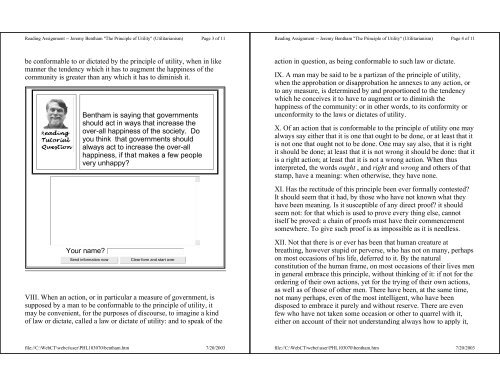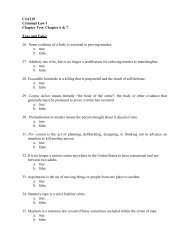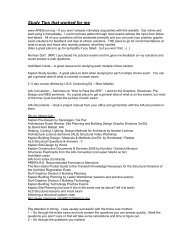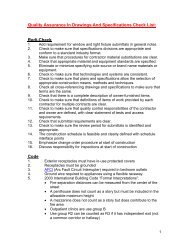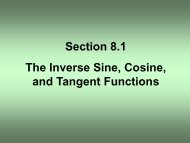Reading Assignment -- Jeremy Bentham "The Principle <strong>of</strong> Utility" (Utilitarianism)Page 3 <strong>of</strong> 11Reading Assignment -- Jeremy Bentham "The Principle <strong>of</strong> Utility" (Utilitarianism)Page 4 <strong>of</strong> 11be conformable <strong>to</strong> or dictated by <strong>the</strong> principle <strong>of</strong> utility, when in likemanner <strong>the</strong> tendency which it has <strong>to</strong> augment <strong>the</strong> happiness <strong>of</strong> <strong>the</strong>community is greater than any which it has <strong>to</strong> diminish it.Bentham is saying that governmentsshould act in ways that increase <strong>the</strong>over-all happiness <strong>of</strong> <strong>the</strong> society. Doyou think that governments shouldalways act <strong>to</strong> increase <strong>the</strong> over-allhappiness, if that makes a few peoplevery unhappy?Your name?Send information nowClear form <strong>and</strong> start overVIII. When an action, or in particular a measure <strong>of</strong> government, issupposed by a man <strong>to</strong> be conformable <strong>to</strong> <strong>the</strong> principle <strong>of</strong> utility, itmay be convenient, for <strong>the</strong> purposes <strong>of</strong> discourse, <strong>to</strong> imagine a kind<strong>of</strong> law or dictate, called a law or dictate <strong>of</strong> utility: <strong>and</strong> <strong>to</strong> speak <strong>of</strong> <strong>the</strong>action in question, as being conformable <strong>to</strong> such law or dictate.IX. A man may be said <strong>to</strong> be a partizan <strong>of</strong> <strong>the</strong> principle <strong>of</strong> utility,when <strong>the</strong> approbation or disapprobation he annexes <strong>to</strong> any action, or<strong>to</strong> any measure, is determined by <strong>and</strong> proportioned <strong>to</strong> <strong>the</strong> tendencywhich he conceives it <strong>to</strong> have <strong>to</strong> augment or <strong>to</strong> diminish <strong>the</strong>happiness <strong>of</strong> <strong>the</strong> community: or in o<strong>the</strong>r words, <strong>to</strong> its conformity orunconformity <strong>to</strong> <strong>the</strong> laws or dictates <strong>of</strong> utility.X. Of an action that is conformable <strong>to</strong> <strong>the</strong> principle <strong>of</strong> utility one mayalways say ei<strong>the</strong>r that it is one that ought <strong>to</strong> be done, or at least that itis not one that ought not <strong>to</strong> be done. One may say also, that it is rightit should be done; at least that it is not wrong it should be done: that itis a right action; at least that it is not a wrong action. When thusinterpreted, <strong>the</strong> words ought , <strong>and</strong> right <strong>and</strong> wrong <strong>and</strong> o<strong>the</strong>rs <strong>of</strong> thatstamp, have a meaning: when o<strong>the</strong>rwise, <strong>the</strong>y have none.XI. Has <strong>the</strong> rectitude <strong>of</strong> this principle been ever formally contested?It should seem that it had, by those who have not known what <strong>the</strong>yhave been meaning. Is it susceptible <strong>of</strong> any direct pro<strong>of</strong>? it shouldseem not: for that which is used <strong>to</strong> prove every thing else, cannotitself be proved: a chain <strong>of</strong> pro<strong>of</strong>s must have <strong>the</strong>ir commencementsomewhere. To give such pro<strong>of</strong> is as impossible as it is needless.XII. Not that <strong>the</strong>re is or ever has been that human creature atbreathing, however stupid or perverse, who has not on many, perhapson most occasions <strong>of</strong> his life, deferred <strong>to</strong> it. By <strong>the</strong> naturalconstitution <strong>of</strong> <strong>the</strong> human frame, on most occasions <strong>of</strong> <strong>the</strong>ir lives menin general embrace this principle, without thinking <strong>of</strong> it: if not for <strong>the</strong>ordering <strong>of</strong> <strong>the</strong>ir own actions, yet for <strong>the</strong> trying <strong>of</strong> <strong>the</strong>ir own actions,as well as <strong>of</strong> those <strong>of</strong> o<strong>the</strong>r men. There have been, at <strong>the</strong> same time,not many perhaps, even <strong>of</strong> <strong>the</strong> most intelligent, who have beendisposed <strong>to</strong> embrace it purely <strong>and</strong> without reserve. There are evenfew who have not taken some occasion or o<strong>the</strong>r <strong>to</strong> quarrel with it,ei<strong>the</strong>r on account <strong>of</strong> <strong>the</strong>ir not underst<strong>and</strong>ing always how <strong>to</strong> apply it,file://C:\WebCT\webct\user\PHL103070\bentham.htm7/20/2003file://C:\WebCT\webct\user\PHL103070\bentham.htm7/20/2003
Reading Assignment -- Jeremy Bentham "The Principle <strong>of</strong> Utility" (Utilitarianism)Page 5 <strong>of</strong> 11Reading Assignment -- Jeremy Bentham "The Principle <strong>of</strong> Utility" (Utilitarianism)Page 6 <strong>of</strong> 11or on account <strong>of</strong> some prejudice or o<strong>the</strong>r which <strong>the</strong>y were afraid <strong>to</strong>examine in<strong>to</strong>, or could not bear <strong>to</strong> part with. For such is <strong>the</strong> stuff thatman is made <strong>of</strong>: in principle <strong>and</strong> in practice, in a right track <strong>and</strong> in awrong one, <strong>the</strong> rarest <strong>of</strong> all human qualities is consistency.XIII. When a man attempts <strong>to</strong> combat <strong>the</strong> principle <strong>of</strong> utility, it iswith reasons drawn, without his being aware <strong>of</strong> it, from that veryprinciple itself. His arguments, if <strong>the</strong>y prove any thing, prove not that<strong>the</strong> principle is wrong , but that, according <strong>to</strong> <strong>the</strong> applications hesupposes <strong>to</strong> be made <strong>of</strong> it, it is misapplied . Is it possible for a man <strong>to</strong>move <strong>the</strong> earth? Yes; but he must first find out ano<strong>the</strong>r earth <strong>to</strong> st<strong>and</strong>upon.XIV. To disprove <strong>the</strong> propriety <strong>of</strong> it by arguments is impossible; but,from <strong>the</strong> causes that have been mentioned, or from some confused orpartial view <strong>of</strong> it, a man may happen <strong>to</strong> be disposed not <strong>to</strong> relish it.Where this is <strong>the</strong> case, if he thinks <strong>the</strong> settling <strong>of</strong> his opinions on sucha subject worth <strong>the</strong> trouble, let him take <strong>the</strong> following steps, <strong>and</strong> atlength, perhaps, he may come <strong>to</strong> reconcile himself <strong>to</strong> it.1. Let him settle with himself, whe<strong>the</strong>r he would wish <strong>to</strong> discard thisprinciple al<strong>to</strong>ge<strong>the</strong>r; if so, let him consider what it is that all hisreasonings (in matters <strong>of</strong> politics especially) can amount <strong>to</strong>?2. If he would, let him settle with himself, whe<strong>the</strong>r he would judge<strong>and</strong> act without any principle, or whe<strong>the</strong>r <strong>the</strong>re is any o<strong>the</strong>r he wouldjudge an act by?3. If <strong>the</strong>re be, let him examine <strong>and</strong> satisfy himself whe<strong>the</strong>r <strong>the</strong>principle he thinks he has found is really any separate intelligibleprinciple; or whe<strong>the</strong>r it be not a mere principle in words, a kind <strong>of</strong>phrase, which at bot<strong>to</strong>m expresses nei<strong>the</strong>r more nor less than <strong>the</strong>mere averment <strong>of</strong> his own unfounded sentiments; that is, what inano<strong>the</strong>r person he might be apt <strong>to</strong> call caprice?4. If he is inclined <strong>to</strong> think that his own approbation ordisapprobation, annexed <strong>to</strong> <strong>the</strong> idea <strong>of</strong> an act, without any regard <strong>to</strong>its consequences, is a sufficient foundation for him <strong>to</strong> judge <strong>and</strong> actupon, let him ask himself whe<strong>the</strong>r his sentiment is <strong>to</strong> be a st<strong>and</strong>ard <strong>of</strong>right <strong>and</strong> wrong, with respect <strong>to</strong> every o<strong>the</strong>r man, or whe<strong>the</strong>r everyman's sentiment has <strong>the</strong> same privilege <strong>of</strong> being a st<strong>and</strong>ard <strong>to</strong> itself?5. In <strong>the</strong> first case, let him ask himself whe<strong>the</strong>r his principle is notdespotical, <strong>and</strong> hostile <strong>to</strong> all <strong>the</strong> rest <strong>of</strong> human race?6. In <strong>the</strong> second case, whe<strong>the</strong>r it is not anarchial, <strong>and</strong> whe<strong>the</strong>r at thisrate <strong>the</strong>re are not as many different st<strong>and</strong>ards <strong>of</strong> right <strong>and</strong> wrong as<strong>the</strong>re are men? <strong>and</strong> whe<strong>the</strong>r even <strong>to</strong> <strong>the</strong> same man, <strong>the</strong> same thing,which is right <strong>to</strong>-day, may not (without <strong>the</strong> least change in its nature)be wrong <strong>to</strong>-morrow? <strong>and</strong> whe<strong>the</strong>r <strong>the</strong> same thing is not right <strong>and</strong>wrong in <strong>the</strong> same place at <strong>the</strong> same time? <strong>and</strong> in ei<strong>the</strong>r case, whe<strong>the</strong>rall argument is not at an end? <strong>and</strong> whe<strong>the</strong>r, when two men have said,“I like this”, <strong>and</strong> “I don't like it”, <strong>the</strong>y can (upon such a principle)have any thing more <strong>to</strong> say?7. If he should have said <strong>to</strong> himself, No: for that <strong>the</strong> sentiment whichhe proposes as a st<strong>and</strong>ard must be grounded on reflection, let him sayon what particulars <strong>the</strong> reflection is <strong>to</strong> turn? if on particulars havingrelation <strong>to</strong> <strong>the</strong> utility <strong>of</strong> <strong>the</strong> act, <strong>the</strong>n let him say whe<strong>the</strong>r this is notdeserting his own principle, <strong>and</strong> borrowing assistance from that veryone in opposition <strong>to</strong> which he sets it up: or if not on those particulars,on what o<strong>the</strong>r particulars?8. If he should be for compounding <strong>the</strong> matter, <strong>and</strong> adopting his ownprinciple in part, <strong>and</strong> <strong>the</strong> principle <strong>of</strong> utility in part, let him say howfar he will adopt it?9. When he has settled with himself where he will s<strong>to</strong>p, <strong>the</strong>n let himask himself how he justifies <strong>to</strong> himself <strong>the</strong> adopting it so far? <strong>and</strong>why he will not adopt it any far<strong>the</strong>r?10. Admitting any o<strong>the</strong>r principle than <strong>the</strong> principle <strong>of</strong> utility <strong>to</strong> be afile://C:\WebCT\webct\user\PHL103070\bentham.htm7/20/2003file://C:\WebCT\webct\user\PHL103070\bentham.htm7/20/2003


